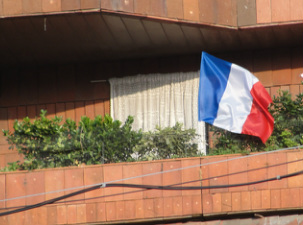 After I wrote "How France Changed Me," I realized there were a lot of significant changes that I left out. With no further adieu, here are a few more ways that I have been transformed.
1. I use the metric system. I am not afraid of Celsius, kilometers or milliliters anymore. I can even tell you what a centiliter is.
2. My social etiquette has changed. You will find me waiting for a bon appetit before beginning to eat. My finger foods group has shrunk. I find kissing people to say hello and goodbye more or less normal.
3. I use the 24-hour clock. Seven p.m. is now 19:00. Midnight is now 0:00. The nice thing about the 24-hour clock is that you can't mistakenly set your alarm for a.m. instead of p.m. I'm converted!
4. My friends are just my friends. Growing up in a fairly homogenous population, other ethnicities and nationalities were rare. In France, it was pretty normal to meet people from other countries. I no longer have American friends and French friends. Friends are friends. Period.
5. I value Sabbath time more. In France, everything was closed on Sundays. At first, I had to be intentional about making sure I had everything I needed on Saturday. After a while, I appreciated the quiet of Sundays and the fact that nearly everyone could rest and/or spend time with their family and friends on that day. Also, in learning a new language and adapting to a new culture, I was tired more often. This was more difficult than stores being closed. Eventually, I accepted the fatigue and gave myself permission to read a book, take a nap or go to bed early once in a while.
 I learned France is more than just Paris and the Eiffel Tower. I learned France is more than just Paris and the Eiffel Tower. We are products of culture – including geography, heritage, family, language, cuisine and so much more.
Before coming to France, the longest I had lived in a "foreign" culture was five months when I traveled with a music and relational ministry team around South America. Even though this was a significant and formative experience, we were living in host homes and changed locations on average weekly. I could never "settle in."
In Toulouse, I had an address and the opportunity to establish myself as a resident of the city. Even as a foreigner, I had a sense of belonging.
We often talk about how we made a mark on a place, but in this post, I want to talk about how this place and country made its mark on me.
So how did I change? I'm sure I have yet to note all the ways. Besides the obvious differences like speaking the language and knowing more about French cuisine, here is a short list of the differences I am aware of:
1. I don't drive. It has been more than 10 months since I have driven a car. Crazy, right? Europe has a great public transportation system, and Toulouse is no exception. I learned landmarks and gave directions in relation to metro stops. With the lack of parking (and necessity of parallel parking if you do find a spot), I appreciated using my own two feet when I could. I also had a bike card where I could check out a bike from one station and return it to another. Covoiturage or carpool was also my friend and a great way to meet new people and get where I needed to go.
2. I value quality over quantity. Most of you know that I am a recovering bargain hunter. I still love a good deal (and free stuff). However, I now look for signs of quality (like looking to see if a bottle of wine was bottled on the property or seeing whether a cheese was made with pasteurized or raw milk). Not having a car, I adopted French habits of buying less more often. Having a collection of 50 cereal boxes was no longer realistic. My pantry consisted of a few packages of pasta and rice, spices, a box of cereal and oatmeal, and a few baking staples.
3. I buy more freshly and directly. One-stop shopping is synonymous with the United States. In France, I learned to buy my fresh fruits and vegetables from the market, my meat from the butcher shop and my bread from the bakery. I appreciated eliminating the "middle man" when possible and having a more relational buying experience. And let me tell you – fresh is better! I only bought a few bags of frozen vegetables for the times that I couldn't make it to the market.
4. I take more time. I used to think it took forever to get anywhere. Now I am used to budgeting an extra half-an-hour on each side of an errand. It is normal. I make more meals from scratch (microwaves are just for reheating leftovers), and I expect lunch to take at least an hour and dinner to take at least two hours. I still value efficiency, but with the realization that I will never get as much done as I would like to each day. And I'm ok with it.
5. I agree to disagree – all the time. I assume when I meet someone that we probably don't share the same beliefs, and it doesn't intimidate me. While I don't volunteer much information up front, I am comfortable expressing my ideas without worrying if someone will be deeply offended and disown me. The French have mastered the art of respectful, intelligent debate, and I am a fan.
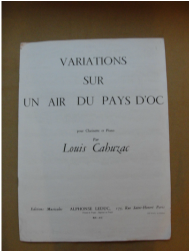 "Variations Sur Un Air Du Pays D'Oc" was lying on top of my end table when I was looking for clarinet music to practice this summer. I knew I had packed it, but I honestly didn't know much about it.
I played this for a high school contest when the only French I knew was, "bonjour" and "merci." I'm sure my French friends would have been appalled at my Anglicized pronunciation, which would have gone something like, "Vay-rie-ay-shuns suhr unn air doo payz dock."
Now, having lived in France for several months, I knew that pays d'oc was referring to the region of France where Occitan, a dialect, is spoken. Toulouse, the city I was living in, belongs to this language group.
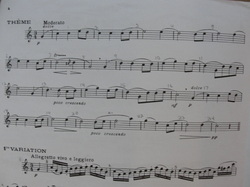 After doing a bit of research, I learned that the composer, Louis Cahuzac, grew up less than two hours from Toulouse and attended the Toulouse conservatory. This piece was based off of a folk tune, Se Canto, originating in the valley of the Garonne (which is the river that runs through Toulouse). I never imagined that I would get so "close" to this music.
How did this high school musician from Minot, ND end up as a 20-something Christian worker in Toulouse, France? God only knows.
He knew long before I even learned to play a clarinet, that I would be called to serve in France. He knew I would become a part of a beautiful community where I could walk alongside and support nationals, learn French and even be given the opportunity to play in a French clarinet ensemble (with clarinetists and teachers from this very same conservatory).
Already, the variations of my life that God has written astonish me. The timid girl who couldn't even raise her hand to use the bathroom became a high school student who loved performing. That young woman became a college student with three majors, who felt called to lead a team of five strangers playing music and doing relational ministry in the US and South America after she graduated. That fledgling leader got broken of entitlement during a 15-month period of underemployment, started a couple ministries with help from friends, organized some renegade trips to serve in Ecuador and China while working full-time and then left it all to move to France.
Now, in my last years of my 20s, I am off to Berlin to tell the stories of what God is doing as Christians unite to seek the welfare of the city. Do I know what this next variation will bring? Not completely. But I know that God writes some incredibly beautiful symphonies out of our brokenness and weaknesses and that His plans are much more extensive and trustworthy than mine.
"'For I know the plans I have for you,' declares the Lord, 'plans for welfare and not for evil, to give you a future and a hope.'" – Jeremiah 29:11
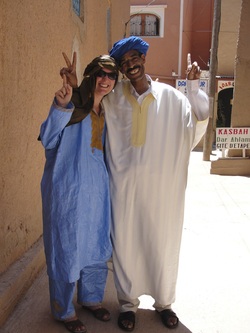 Powerless. This is what I felt like as a woman in Morocco.
Don't get me wrong. Morocco is a beautiful, incredible country. I was blown away by breathtaking sights – the Atlas Mountains, ancient cities, endless rolling sand dunes.
My trip with my friend Alyssa was my first taste of life in a non-Western, Muslim-dominant culture. Unintentionally, we also arrived near the end of Ramadan.
Immediately I noticed 98 percent of workers were men, and 98 percent of women had covered heads (the best was the woman with a burqa riding a motorcycle...that's talent!).
We immediately fell prey to one of the many "helpful" men, who called out to us and "made us" accept their help. When the young man asked us for money for his help (he led us around the labyrinth of the Marrakesh medina) to make sure we would be dependent on him, I told him we had nothing to offer him. But my word meant nothing. Even when I chewed him out in French (a first for me) and offered him a coin that Alyssa had, he continued to yell and bang on the door. Only the guest house owner (a man) was able to make him leave.
On the streets, we would get hassled and cat-called. That is, unless a man was with us. Silence.
When we got bedbugs, I brought Exhibit A (the bedbug I captured in my sleep) and prepared a beautiful presentation with identical verified bedbug pictures that I found on the internet. It didn't matter. I was told that the bug was just a mosquito that flew in through the window.
As a result of the bedbugs, we bought Moroccan clothing. The shop owner was happy to show us all his kaftans and offer us a great price. However, when I was ready to pay, the price rose by about 30 percent. I expressed my displeasure and stated the price he had quoted.
Just then, our bus driver (a man) who was also in the shop, began yammering at the shop owner in Berber. I couldn't understand what they were saying, but after observing disgruntled and concessionary body language, it was clear that the shop owner had given in. The price was lowered back to the original, not just for me, but also for Alyssa. Justice.
My experiences in Morocco showed me just how much I am in need of an advocate; someone who can intercede and bring justice. In Western societies, there isn't much that I can't do as a woman. I am independent. But I realize that in other cultures and also biblically, I need help.
In the Bible, there were high priests who interceded for the people, so that they would be able to approach God without fear of God's wrath for their sin. Now, there aren't need for for additional high priests, as Jesus serves as the ultimate high priest.
Now there have been many of those priests, since death prevented them from continuing in office; but because Jesus lives forever, he has a permanent priesthood. Therefore he is able to save completely those who come to God through him, because he always lives to intercede for them.
Such a high priest truly meets our need—one who is holy, blameless, pure, set apart from sinners, exalted above the heavens. Unlike the other high priests, he does not need to offer sacrifices day after day, first for his own sins, and then for the sins of the people. He sacrificed for their sins once for all when he offered himself. For the law appoints as high priests men in all their weakness; but the oath, which came after the law, appointed the Son, who has been made perfect forever (Hebrews 7:23-28)
What a comfort it is to know that I have Jesus who lives to intercede for me and all believers. That in spite of my weakness (in this case, sin), I am saved and thus stand justified before God because of the "once-for-all" work of Jesus on the cross.
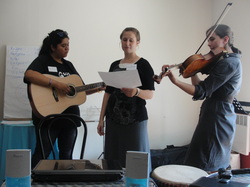 Imagine that every song in church is a bad translation from Chinese in an Eastern style that you don't know how to sing. The songs use metaphors about rice and chopsticks and the Great Wall of China.
It's not that you haven't accepted the Gospel – you have, but it seems that if you want to worship God, you have to give up everything you know from your culture and follow the lead of foreigners.
Although this is just a hypothetical example, the reality is that many well-intentioned missionaries over the years have imported religion from their home cultures. This is most evident in the use of translated songs in churches across the world.
I remember being in a Lutheran church in Colombia, where an entire hymnal had been translated from English to Spanish. The people sang while accompanied by a piano, but it felt like someone had just superimposed Spanish subtitles on an American worship service. Was the Gospel being preached? Yes. Did the hymns speak truth? Yes. Did the congregants identify with the music they were singing? Not so much.
Compare this to an Ecuadorian church I visited where all the songs were written by Latin American artists in a latin style with their instruments. This church was vibrant and full. The congregants sang loudly and weren't afraid to move a little bit. The lyrics spoke to the heart of the Ecuadorian people. 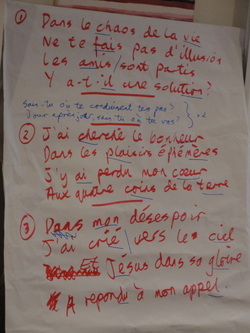 I attended a music workshop in the Normandy region of France last month which addressed these same issues. We discussed how translated music usually either loses something in translation or loses musicality in preserving the original message.
We made a list of styles of music. Out of about 50 styles, three are being used in our churches. We considered issues that the French face and thematic gaps in worship.
During the second half of the workshop, we chose a style, theme and issue and wrote a song. Pictured left are the lyrics to the Christian reggae song that we wrote.
The song addresses searching for meaning in the midst of hardship. The chorus asks questions. The lyrics are quite poetic and philosophical. We chose not to mention Jesus until the very last verse, so that a non-believer would identify and listen to the song. We did our best to avoid "Christianese" – or words used commonly among in Christian circles – that can often make those on the outside feel excluded. The finished product felt very French.
This fall, our team will be partnering with French and European church planters to see a new church planted in a neighborhood untouched by the Gospel. I am challenged by this conference to seek out French music by French artists to be used in worship – and if there are gaps, to work with French nationals to create songs that the people will sing.
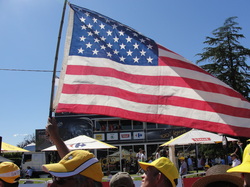 Americans are patriotic – even in France. Americans are patriotic – even in France. What does it mean to be patriotic? Is it in outward symbols?
Is it in the waving of flags, in the singing of patriotic songs and national anthems, in wearing national colors, in speaking a language, in having an army, in watching a parade, in setting off fireworks, in celebrating a national holiday?
When I came to France, I assumed it was a very patriotic country. Like the United States, it is a historically powerful country. Many countries were originally colonized by France. There are 33 that claim French as an official language (second only to English, spoken as an official language in 45 countries). Both French and English are taught in every country of the world and spoken on five continents.
While it is true that most French people I have met are proud to claim their nationality and passionate about their language, the manner of expressing this patriotism is displayed much differently. I can't make any assumptions about levels of patriotism in France as compared to the United States. Maybe the age of our countries plays a factor. The oldest city in France, Marseille, dates back to 600 BC. European colonization in the United States didn't begin until 1600, and the country declared its independence from Britain in 1776.
Perhaps, patriotism in France is more of an inward pride rather than an outward display. According to Myers-Briggs research (that test of E/I, N/S, F/T, J/P), American culture is predominantly extroverted thinking whereas French culture is predominately introverted feeling.
I may be an introverted feeler, but I grew up in an extroverted thinking culture. So on July 4, although I didn't want to be too obviously patriotic outside of my home country, I still felt the need to wear red, white and blue (no American flags though) and put fireworks and the Statue of Liberty on my Facebook wall. Friends asked me if I was doing anything to celebrate in France. I don't know that there were many celebrations, but I know there was at least one at the US Embassy (which I wasn't able to attend).
On July 14 (France's national holiday aka Bastille Day), I was prepared to wish all my French friends a "Happy 14th of July," see French flags everywhere and listen to the Marseillaise (the French national anthem) all day long.
Now I did hear the Marseillaise (granted, the first time was during a performance of the 1812 Overture which was written to celebrate victory over France, but the national anthem was still quoted, nevertheless). There were outdoor celebrations, fireworks and parades (traditionally in France there is always a large military parade).
However, most people were not wearing "national" colors, and one French friend was insistent that you shouldn't say anything to wish people a happy national holiday (others later said that it was allowed). In church, we sang no patriotic hymns nor did we pray for the country as we often do in the US. I saw one lone French flag (I'm not sure if it always there or was displayed for the celebration). I heard some French music, but I also heard a great deal of music in English.
I was surprised by this apparent lack of patriotism. But then again, do outward displays say anything about inner allegiance? Does a flag in my hand make me a citizen of a country?
I'm not sure how to measure patriotism. It may be that it's not in flags, patriotic lyrics or in grandiose displays of national pride. Nevertheless, I am challenged being outside of my home culture to really consider what it looks like to be a proud citizen of a country. I am also challenged to rethink what it means to be a citizen of the United States and to represent my country well – at home or away.
The whirring of tires and pedals. Jerseys of many colors. A cheering crowd. Cameras. Cries. Concluded. All in about a minute.
When I heard that the seventh stage of the 100th Tour de France would be passing less than an hour from Toulouse, I decided it was time to cross this off my bucket list. A few friends and I made covoiturage (carpool) reservations and set out on a "less-than-a-day" trip to Albi.
The various stages (21 to be exact) make the Tour unique. The infamous yellow jersey is worn by the overall time leader. The green jersey belongs to the rider with the most points. The red polka-dotted jersey goes to the best climber. The white jersey goes to the rider age 25 or under with the best time. There is also a combativity award and team classification given after each state.
Each stage starts and finishes in a different city. Roads are transformed into a race course complete with cameras, VIP areas, concessions, souvenirs and the like. A couple hours before the riders finish, a caravan passes. The caravan is much like a parade, with floats, candy, hats and excitement.
 I guess this is what happens if you OD on steroids before the race ;). While all the spectators are having a party, the cyclists are pedaling hard with only their fellow competitors for company. Then in the last few kilometers, they are greeted by the rumbling and screaming of fans (this is a short video of the last of the leaders and the American flag – we ended up behind an overly enthusiastic American). All this work for a moment of glory. To wake up each day to start the next stage with the same routine. It reminds me a bit of the pace of life. Thirteen years of school to walk across a stage in a room full of people to receive a high school diploma. Four or five more years to walk across another stage for another degree. Years of dating before a wedding day. Nine months waiting to hold a baby. And the list goes on.
We compete for the rare moments of glory – the times when we get the promotion, have the best car, win the race, but for what gain? The writer of Ecclesiastes writes, "All is vanity.What does man gain by all the toil at which he toils under the sun?"
I doubt that Chris Froome, the winner of this year's tour, will wear his yellow jersey forever. One day his prize money will run out. One day he might not even be able to pedal a bike. Then what?
I find it necessary to see a more extensive picture – one where not every camera angle focuses on me, one where my successes matter, not just for me, but for my neighbor as well. One where my failures can be redeemed for the greater good. For me, I find this in my Christian faith. This doesn't mean that I don't compete, but the only prize that matters, salvation, is already won and is offered freely.
For those of you who made it to the end of this post, you will be rewarded. I have one last video to share (this one is not so serious). Just so you know that the tour really does take place in France, here a video of the baguette mascot. Yes, a man in a giant baguette suit handing out pieces of bread, baguettes and hats. Pretty amazing, right? Did I mention that the temperature broke 90 degrees (F)?
 I mentioned in my last post that the Toulouse clarinet ensemble that I play with was taped during two of our performances at the open air festival. Well today the director sent us all a link to one of the videos about the festival.
You can see and hear our ensemble play and also take in the sights and sounds of the day. One of goals of the day was to get people back in touch with the earth and agriculture. There were nature walks and various activities (you can even watch little kids make brioches).
The video is all in French, so for those of you who are francophones or just want to listen to the language, have fun! The music, of course, is a language of its own :).
 Playing clarinet with the Frenchmen in the countryside. Playing clarinet with the Frenchmen in the countryside. I made (or played) my French musical debut with l'Ensemble de Clarinettes de Toulouse on Sunday.
Everything happened rather unexpectedly. I found the ensemble via Facebook, exchanged some emails with the director and attended my first rehearsal with the ensemble the previous Thursday. I enjoy the group immensely. The ensemble is made up of professionals, high-level amateurs and conservatory students. They welcomed me warmly, giving me compliments on my ability to speak French and sight-read music, and afterward I was invited to play for the group's last concert of the season.
As I often do, I agreed without completely knowing what I was getting myself into. All I knew was that I needed to meet the group at the metro, that we would be eating lunch and that we would be playing for two hours.  This is the poster for the event we played at – definitely "country-style." This is the poster for the event we played at – definitely "country-style." It turns out that we were playing at an open-air festival in the countryside more or less outside of Toulouse. You could buy cheese, bread, jelly and even sheep while listening to various musical ensembles, taking a ride on a horse-drawn carriage and learning to identify tree species. Pretty spectacular!
We ate many assorted delicious farm products (which were unidentified, but how can you go wrong?), and then we played at three sites around the festival.
At the first station, a video camera came to tape us and some of my friends came out to watch us play. At the second station, we kept being interrupted by a lady with a very strong Southwestern accent making announcements (and I entertained my fellow clarinetists in my attempts to imitate her speech).
The third station was on the top of a very large hill. It was probably at least a half-mile walk up and quite steep. And remember that we are carrying clarinets and stands on a very windy day. I was told after the hike that the ensemble "rarely" plays gigs like this.
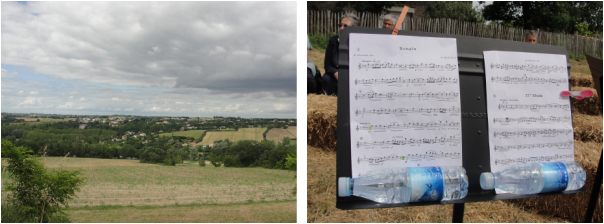 The view from the top of the hill (left). Our attempts to keep the music on the stand (right). The view from the top of the hill (left). Our attempts to keep the music on the stand (right).
At the this last station, we had a hard time keeping the music on the stand. Actually, a gust of wind took our music at the end of one of the pieces. What a finish! Thankfully the kind spectators helped us recover our music. We had torn everything down when a television station car pulled up. The camera people asked if we could play for them, and we agreed. So they rearranged the hay bales for ten minutes to set up a better camera angle, and we then we performed a 30-second clip.
All in all, I wouldn't have imagined a debut like this, but it was fabulous. It is summer vacation now in France, and I am sad to have a couple of months without this musical camaraderie. However, on the trek back down the hill, the director offered me a first clarinet position in September for the new season. I am looking forward to continuing with this welcoming and musically skilled ensemble in the fall.
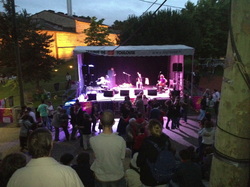 I experienced regional music for the first time last weekend. Every year there is la Fête de la Musique (music party/festival) in France and in many other countries as well. Musicians and musical groups play concerts all across town starting in the evening and continuing well into the night.
A couple friends and I went to hear music in Occitan. Occitan is a regional language from the southwest of France (each region has its own dialect). The only other time I hear the language spoken is during the metro stop announcements in the subway. It sounds like a strange mixture of Spanish and Italian.
With music comes dancing, and my German teammate Binia and I joined in the traditional dances for the first time. We tried to follow along, and hopefully nobody noticed that we had no idea what we were doing. I was fascinated by the instrumentation and instruments, so I took a couple short videos on my phone. Hopefully this will give you a bit of an aural picture of Occitan.
|








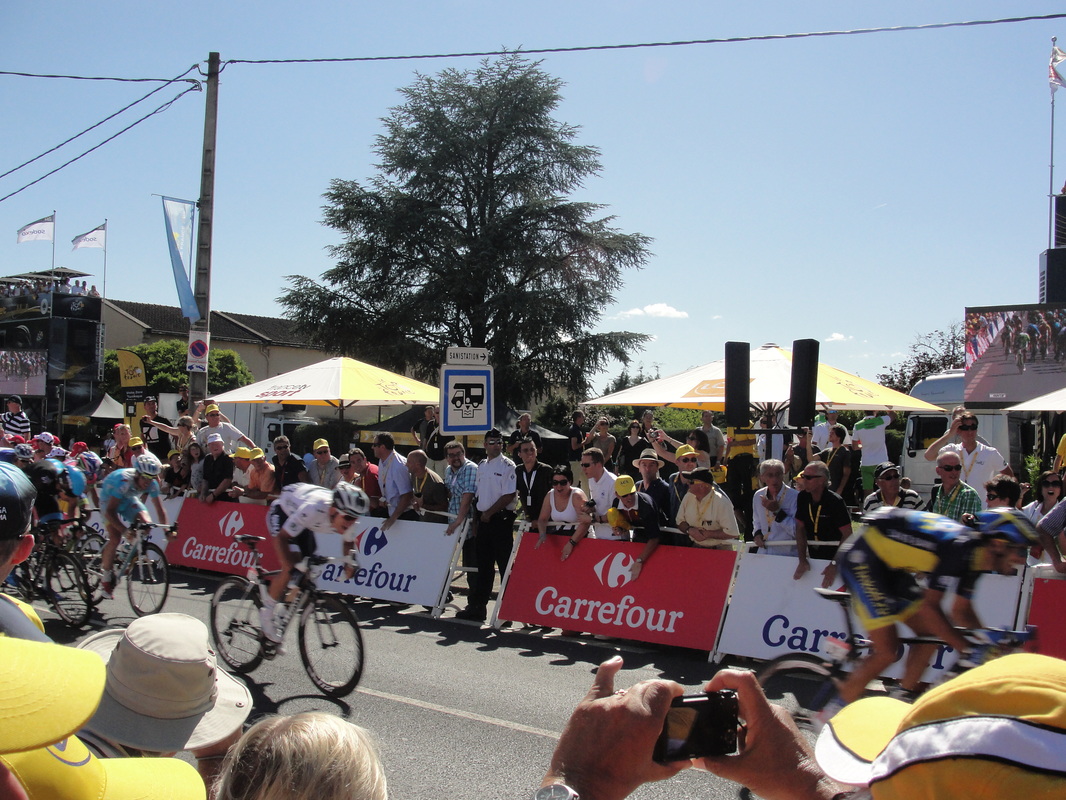






 RSS Feed
RSS Feed